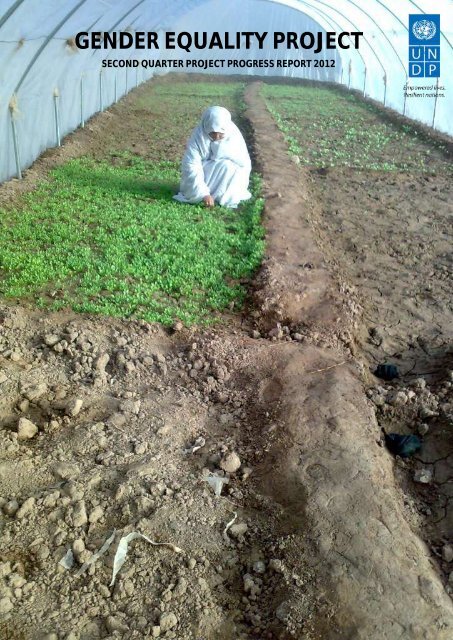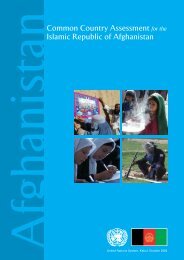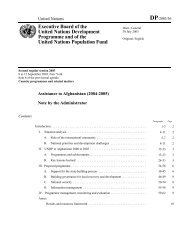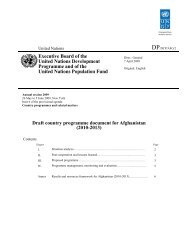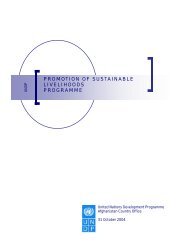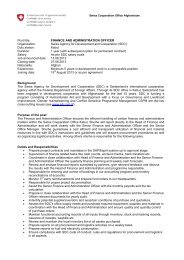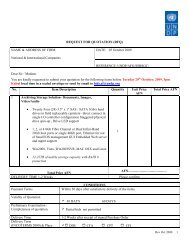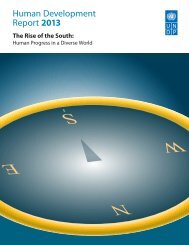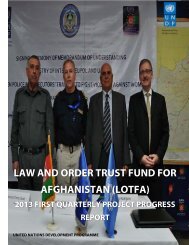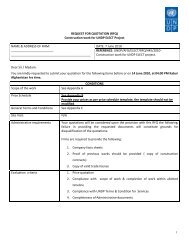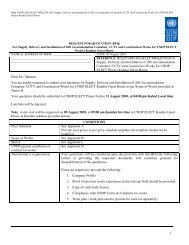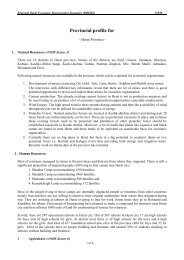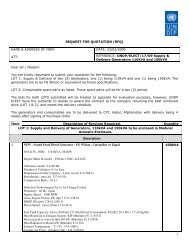GENDER EQUALITY PROJECT - UNDP Afghanistan
GENDER EQUALITY PROJECT - UNDP Afghanistan
GENDER EQUALITY PROJECT - UNDP Afghanistan
Create successful ePaper yourself
Turn your PDF publications into a flip-book with our unique Google optimized e-Paper software.
<strong>GENDER</strong> <strong>EQUALITY</strong> <strong>PROJECT</strong><br />
SECOND QUARTER <strong>PROJECT</strong> PROGRESS REPORT 2012
DONOR<br />
<strong>PROJECT</strong> INFORMATION<br />
Project ID: 00054320<br />
Duration: March 01 June 30, 2012<br />
Strategic Plan Component: Gender Equality and Empowerment of Women<br />
CPAP Component:<br />
Increased opportunities for income generation through promotion of<br />
diversified livelihoods<br />
ANDS Component:<br />
Good Governance (Gender Equality as one of the six cross-cutting themes)<br />
Total Budget: USD 2,999,800<br />
Responsible Agency: United Nations Development Programme (<strong>UNDP</strong>)<br />
Cover Photo: Women beneficiaries at Zindajan district of Hirat province are benefiting from green-house<br />
technology. Credit: Nooragha Tajik, Provincial Coordinator, GEP
ACRONYMS<br />
AWP<br />
CSO<br />
CSO<br />
DoJ<br />
DoHRA<br />
DoWA<br />
FAO<br />
GoIRA<br />
GRB<br />
IDLG<br />
IEC<br />
LHC<br />
LM<br />
LOTFA<br />
MAIL<br />
M&E<br />
MoEc<br />
MoF<br />
MoHRA<br />
MoI<br />
MoWA<br />
NAPWA<br />
NIBP<br />
NPP<br />
PWDC<br />
<strong>UNDP</strong><br />
GEP<br />
WPDC<br />
Annual Work Plan<br />
Civil Society Organization<br />
Central Statistics Office<br />
Department of Justice<br />
Department of Hajj and Religious Affairs<br />
Food and Agriculture Organization<br />
Government of the Islamic Republic of <strong>Afghanistan</strong><br />
Gender Responsive Budget<br />
Independent Directorate for Local Governance<br />
Independent Election Commission<br />
Legal Help Centres<br />
Line Ministries<br />
Law and Order Trust Fund Project for <strong>Afghanistan</strong><br />
Ministry of Agriculture Irrigation and Livestock<br />
Monitoring and Evaluation<br />
Ministry of Economy<br />
Ministry of Finance<br />
Ministry of Haj and Religious Affairs<br />
Ministry of Interior<br />
National Action Plan for the Women of <strong>Afghanistan</strong><br />
National Institution Building Programme<br />
National Priority Programme<br />
United Nations Development Programme<br />
Gender Equality Project<br />
ntre
TABLE OF CONTENTS<br />
EXECUTIVE SUMMARY ............................................................................................................................ 1<br />
OUTPUT 1: Policy development capacity of MoWA enhanced through the establishment of WPDC<br />
for ensuring other line ministries to develop and implement gender sensitive policies/strategies . 2<br />
1. FINANCIALS ............................................................................................................................. 8<br />
2. RISKS/ISSUES ........................................................................................................................... 8<br />
3. LESSONS LEARNED .................................................................................................................. 8<br />
4. FUTURE PLAN .......................................................................................................................... 9<br />
OUTPUT 2: Strengthened sub-national institutions to promote socio-economic empowerment of<br />
women ................................................................................................................................................ 9<br />
1. FINANCIALS ........................................................................................................................... 14<br />
2. RISKS/ISSUES ......................................................................................................................... 14<br />
3. LESSONS LEARNED ................................................................................................................ 14<br />
4. FUTURE PLAN ........................................................................................................................ 15<br />
A. ANNEX 1: FINANCIAL TABLE ...................................................................................................... 16<br />
B. ANNEX 2: EXPENSES BY OUTPUT .............................................................................................. 17<br />
C. ANNEX 3: ACTIVITY .................................................................................................................... 18<br />
D. ANNEX 4: RISK LOG ................................................................................................................... 20<br />
E. ANNEX 5: ISSUE LOG ................................................................................................................. 21
EXECUTIVE SUMMARY<br />
The Gender Equality Project (GEP) aims to establish models in cooperation, coordination and<br />
public sector effectiveness for gender mainstreaming, promotion of gender equality and<br />
strengthening of the position of women, with selected key government and non-government<br />
partners. In order to achieve this, the project has two outputs of: strengthening the capacity of the<br />
WA) as a policy making and oversight body for an effective<br />
implementation of the National Action Plan for Women of <strong>Afghanistan</strong> (NAPWA) and<br />
strengthening the capacity of sub-national institutions with the establishment of Provincial<br />
-economic empowerment of women.<br />
In Q2, progress under Output 1 included improving the capacity of MoWA for the collection of<br />
gender-disaggregated data for the implementation of the NAPWA indicators and also facilitate the<br />
integration of gender sensitive components into the policies and programmes of line ministries<br />
(LMs), institutionalizing a networking mechanism within MoWA for the collection and<br />
dissemination of gender specific information, and the review of three LMs and two independent<br />
organizations.<br />
The Monitoring and Evaluation (M&E) mechanism was revised and submitted for the final approval<br />
before being implemented. In addition, support was provided to the other LMs which included the<br />
review of budget making documents of the Budget Directorate in the Ministry of Finance (MoF) for<br />
integrating gender in the preparation of budgets of the seven pilot ministries, development of<br />
capacity development of female extension staff at the Ministry of Agriculture, Irrigation and<br />
Livestock (MAIL), closer coordination with the Ministry of Hajj and Religious Affairs (MoHRA) for<br />
collaborating with religious leaders on gender sensitive issues, provision of guidance for the<br />
preparation of the gender policy of the MoHE among others. The training of Capacity<br />
Development Officers of the <strong>UNDP</strong> National Institutional Building (NIBP) and the officials of the<br />
Ministry of Interior (MoI) in collaboration with the <strong>UNDP</strong> Law and Order Trust Fund for <strong>Afghanistan</strong><br />
(LOTFA) project enriched the outputs of the Gender Cluster through GEP. As a result of these two<br />
interventions, both the projects have integrated gender as a main outcome of their different<br />
initiatives<br />
For Output 2, at the sub-national level, the GEP enhanced the capacity of the members of<br />
elopment Councils (PWDC) in four provinces (Bamyan, Balkh, Herat and<br />
Nangarhar) through its provincial offices in order to improve their service delivery for the socioeconomic<br />
empowerment of women. Other initiatives to support the rural women included<br />
improving the service delivery of the Legal Help Centres (LHC) and completing preparatory<br />
activities for the establishment of the toll-free hotline in the three remaining provinces to assist<br />
vulnerable women in accessing the justice system. In addition, GEP employed innovations<br />
interventions for sensitizing the religious leaders to improve their understanding about the role<br />
and status of women in society. Moreover, trainings for local media personnel to improve the<br />
quality of reporting on gender specific issues were also organized.<br />
Despite the achievements listed above, there were some challenges which impacted on the<br />
se were within the management of the project office<br />
and measures to address them were undertaken in order to continue with the activities.<br />
H<br />
ce and<br />
required close consultations with other development partners to ensure the delivery of those<br />
specific interventions were achieved with minimal delays.<br />
Despite these risks and issues, GEP is committed to its goals and will continue its work in<br />
overcoming deep-rooted gender inequalities in <strong>Afghanistan</strong> through partnerships with MoWA,<br />
civil society organizations, and Afghan women and communities.<br />
1 | P a g e
OUTPUT 1: Policy development capacity of MoWA enhanced through the<br />
establishment of WPDC for ensuring other line ministries to develop and implement<br />
gender sensitive policies/strategies<br />
The focus of Q2 was to deepen support to MoWA in order to improve its capacity as a policy maker<br />
and an oversight body for mainstreaming gender in all Government initiatives. In order to<br />
accomplish this objective, GEP supported and strengthened<br />
Centre (WPDC) by establishing a networking mechanism which allowed WPDC to collect genderdisaggregated<br />
data/information among the nine departments of MoWA 1 . WPDC, in collaboration<br />
with the Central Statistics Office (CSO), prepared a comprehensive report which identified major<br />
gender gaps based on data gathered through the networking mechanism in addition to existing<br />
and available data in CSO. This report was shared with LMs to enable them implement NAPWA<br />
indicators. GEP also assisted in institutionalizing the networking mechanism to ensure this<br />
information was extended to the key LMs for an efficient implementation of the indicators of<br />
NAPWA that have been developed by MoWA. The WPDC also formed an advocacy group within<br />
MoWA which will work with MoWA to analyze the CSO statistical yearbook that is published<br />
annually in order to raise the demand for sex disaggregated data for gender sensitive planning<br />
and formulation of policies by key LMs. A comparative analysis of the statistical yearbooks of<br />
2009/2010 and 2010/2011 was completed in collaboration with CSO and a diagnostic report was<br />
prepared with recommendations for collecting and disseminating further sex-disaggregated data<br />
by the LMs.<br />
To strengt<br />
other ministries, the WPDC also developed gender mainstreaming tools based on the needs<br />
assessment survey of Q1 of Mo<br />
n<br />
Affairs (DoWA) in all 34 provinces. Some of these tools included: Gender Sensitivity Audit Guide,<br />
Gender and Development Mainstreaming Framework and Perception Levels of Knowledge and<br />
Commitment for mainstreaming gender in a systematic manner. These tools will serve as useful<br />
guides for the LMs when implementing NAPWA indicators and ensure gender-specific<br />
components are integrated into their major policies and programmes. The WPDC also completed<br />
the gender analysis of the major policies / programmes of three LMs (MRRD, MoEc and MoHE) as<br />
well as of two independent organizations (IDLG and IEC). These reviews provide MoWA with an<br />
opportunity to guide the revision of existing policies/programmes and supervise the preparation<br />
of new policy documents to make it more gender inclusive.<br />
In addition, GEP continued with its support to the Monitoring and Evaluation (M&E) Unit of the<br />
Ministry. The primary aim of the M&E Unit is to oversee the implementation of the NAPWA<br />
indicators by the LMs. A draft of the M&E mechanism to facilitate this supervision has been<br />
prepared which was revised after obtaining the comments of the senior officials of MoWA and was<br />
re-submitted for the approval of the Deputy Minister - Technical, MoWA. As soon as it is approved<br />
will be rolled out to the line ministries and the provincial offices for implementation and for this,<br />
necessary documents such as information briefs, checklists, and other related documents have<br />
been prepared. A set of guidelines for strengthening the functioning of the Gender Units of the<br />
LMs were prepared and submitted to the senior officials of MoWA for approval.<br />
During Q2, GEP also<br />
management: report writing and communication skills, time management, office conflict<br />
resolution among others. The objective of the training was to familiarize the participants with the<br />
key components of management techniques that would equip them with the skills of an efficient<br />
manager for performing their routine tasks in a professional manner. The training was received<br />
very enthusiastically and the feedback received through an analysis of the evaluation forms of the<br />
participants underpinned the need of organizing such training programmes at regular intervals.<br />
1 Departments: Coordination and International Relations, Provincial Affairs, Training and Advocacy, Finance &<br />
Administration, Economic Empowerment, Legal, Culture & Social Affairs, Human Resources, Coordination<br />
Office of the Minister.<br />
2 | P a g e
Nafisa, one of the participants mentioned that<br />
the importance of time management and that office conflict resolution could contribute so much<br />
to my efficiency. Shukria, expressed ble to write proposals for my<br />
The enhanced capacity of MoWA, through the GEP project, has allowed it to better help LMs to be<br />
more gender aware and inclusive.<br />
In collaboration with Food Agriculture Organization (FAO) and MAIL, GEP completed a two-week<br />
training programme for twenty-one female extension agents. The aim of the training was to<br />
improve the skills of the participants in providing better support to female farmers and agricultural<br />
producers to increase their economic productivity and incomes. The response in the evaluation<br />
forms confirmed that the participants learned new techniques for increasing the productivity of<br />
their constituents as well as on mainstreaming gender in their service delivery package. The<br />
participants requested for this training to be arranged at the provincial level and held at regular<br />
intervals. Also the Director of Home Economics (MAIL) has drafted a mechanism to follow up the<br />
progress of the participants and will keep GEP informed and up-to-date.<br />
In collaboration with the Law and<br />
Trust Fund for <strong>Afghanistan</strong> (LOTFA)<br />
project and the Ministry of Interior<br />
(MoI), GEP implemented a training<br />
programme on basic gender<br />
mainstreaming concepts and the UN<br />
Security Council resolution 1325 2 for<br />
six batches of officials from the MoI.<br />
In total, 160 officials from different<br />
hierarchical levels were trained.<br />
While awarding the certificates, the<br />
Director of the Human Rights<br />
Department of the Ministry<br />
highlighted the need for such<br />
trainings to sensitize his officials for<br />
undertaking their responsibilities in a<br />
gender equitable manner.<br />
In the Ministry of Finance, GEP<br />
recruited a national consultant to<br />
strengthen the functioning of the<br />
Gender Responsive Budgeting (GRB)<br />
Figure 1: Training of 160 MoI officials on Gender<br />
Mainstreaming and the UN Security Council Resolution1325.<br />
Credit: GEP<br />
cell of the Budget Directorate. The national consultant has developed a comprehensive analytical<br />
report on the Budget Circular I of the pilot ministries (Ministry of Public Health, Ministry of Labour<br />
and Social Affairs Martyred and Disabled, Ministry of Education and Ministry of Higher Education).<br />
This report will be used by these pilot LMs when preparing their Budget Circular II which will<br />
ensure gender specific issues are included in the budget proposals of their respective ministries.<br />
The result will be a gender sensitization of the budget making process that would address the<br />
needs of women and men equally through public funded programmes.<br />
In collaboration with the Ministry of Haj and the Religious Affairs (MoHRA), GEP continued to<br />
support their efforts to build a partnership with religious leaders. This will include a conference of<br />
religious leaders to discuss issues relating to gender-based violence and other topics that affect<br />
the madraasas for publicizing gender issues<br />
within Islamic values, organization of exposure visits of religious leaders to other Islamic countries<br />
2 UNSCR 1325: this is a landmark international legal framework that addresses not only the inordinate impact of war on<br />
women, but also the pivotal role women should and do play in conflict management, conflict resolution, and sustainable<br />
peace.<br />
3 | P a g e
for a first-hand experience of the contribution of women in national development within an<br />
overarching Islamic framework, and a more intensive campaign to reach out to the communities<br />
with advocacy materials through different media channels.<br />
In the Ministry of Education (MoE), GEP prepared for the workshop to roll out the gender-sensitive<br />
Curriculum Framework which was developed in Q1.<br />
In the Ministry of Economy, an effort to mainstream gender in the preparation of the macro level<br />
economic development strategy was stalled due to internal issues within the Ministry.<br />
was completed in the three<br />
provinces (Bamyan, Balkh and<br />
Nangarhar) and the research report is<br />
being drafted. The quarterly<br />
newsletter could not be completed due<br />
to a large-scale change of senior<br />
management in Kabul University but it<br />
planned for Q4 once meetings with the<br />
new management have been<br />
organized. However, a pilot training<br />
programme on mainstreaming gender<br />
was launched in the Faculty of<br />
Languages and Literature which was<br />
enthusiastically received by the<br />
students. The evaluation forms<br />
contained their remarks on the<br />
importance of this programme in their<br />
not know the real definition of gender<br />
and that it can contribute to<br />
Figure 2: Participants of the Gender Mainstreaming Programme<br />
in the Faculty of Languages and Literature, Kabul University<br />
Photo Credit: Syed Haroon Ahmadi<br />
must be held more often to sensitize all students about<br />
4 | P a g e
Table 1: Progress towards annual targets for Output 1<br />
2012 Baseline 2012 Annual<br />
Targets<br />
1. WPDC at MoWA WPDC is 80%<br />
not established functional.<br />
Q2 Planned Q2 Actual Comments<br />
Develop networking mechanisms for<br />
the collection and compilation of<br />
gender focused information to be<br />
sent to the line ministries for<br />
facilitating the integration of gender<br />
in their major policies/programmes<br />
Established the networking mechanism<br />
and institutionalized it for a sustained<br />
linkage in the preparation of relevant<br />
information and sharing these with LMs;<br />
activities of the WPDC as specified in the<br />
Annual Work Plan is also being<br />
implemented<br />
On track<br />
2. No line ministries<br />
have developed<br />
gender sensitive<br />
policies and<br />
programmes<br />
according to NAPWA<br />
indicators<br />
Gender sensitive<br />
policies and<br />
programmes<br />
according to<br />
NAPWA<br />
indicators<br />
developed in 18<br />
line ministries<br />
Review of three to four<br />
policies/programmes of LMs &<br />
independent organizations to be<br />
completed as per the strategy<br />
developed in Q 1<br />
Completed review of<br />
policies/programmes of MRRD, MoEc,<br />
and MoHE as well of the IEC and IDLG<br />
Delayed because the process is<br />
taking more time than envisaged<br />
and a revision in the number of LMs<br />
may be necessary in consultation<br />
with the Programme Unit and the<br />
Programme Support Unit<br />
3. 100 public officials<br />
trained in gender<br />
perspective in MoWA<br />
and line ministries<br />
since 2007<br />
Capacity of<br />
additional 200<br />
public officials<br />
on gender<br />
perspective<br />
improved in<br />
MoWA & line<br />
ministries.<br />
Arrange the second phase of<br />
capacity development training for 25<br />
officials of MOWA on communication<br />
skills, time management, report<br />
writing and conflict management.<br />
Completed the second phase of training<br />
of first batch of 25 officials of MoWA on<br />
management techniques.<br />
On track<br />
5 | P a g e
2012 Baseline 2012 Annual<br />
Targets<br />
4. No gender<br />
Gender sensitive<br />
sensitive M&E<br />
mechanism is<br />
mechanism in 80% operational<br />
existence in MoWA in MoWA; 12<br />
monthly, 4<br />
quarterly and 1<br />
Annual report<br />
prepared.<br />
Q2 Planned Q2 Actual Comments<br />
Finalize the M & E mechanism for<br />
implementation NAPWA<br />
Three monthly reports and one<br />
quarterly report developed.<br />
The first round of review of the draft<br />
M&E mechanism for NAPWA<br />
implementation was completed and the<br />
review of the second round is on-going<br />
before the document is approved and<br />
implemented<br />
Regular reporting documents prepared<br />
and submitted to competent authorities<br />
of MoWA<br />
This document should have began<br />
its implementation phase in the<br />
second quarter but there has been a<br />
delay in obtaining the approval of<br />
the decision-making officials of<br />
MoWA prior to implementation<br />
5. Involvement of<br />
women as<br />
beneficiaries in the<br />
projects and<br />
activities of LMs is<br />
less than 10%<br />
involvement as<br />
beneficiaries in<br />
the projects and<br />
activities of LMs.<br />
Assess existing sex disaggregated<br />
data in CSO to determine the impact<br />
of policies and projects on women<br />
Prepare analytical reports on sex<br />
disaggregated data<br />
Assessment of the existing sex<br />
disaggregated data completed and the<br />
gender gaps were identified.<br />
An analytical report containing<br />
necessary recommendations for sex<br />
disaggregated data collection was<br />
prepared and shared with LMs to ensure<br />
the % of women beneficiaries is raised<br />
to 75%<br />
On track<br />
6. Budget Circulars<br />
1&2 and Budget<br />
Statement in Budget<br />
Directorate, Ministry<br />
of Finance only make<br />
brief reference to<br />
gender<br />
disaggregated<br />
allocation of public<br />
funds & expenditure<br />
Gender<br />
Responsive<br />
Budgeting (GRB)<br />
adopted by the<br />
seven pilot<br />
ministries<br />
engaged in<br />
implementing<br />
performance<br />
oriented<br />
budgeting.<br />
Review Budget Circular I (BC I)<br />
documents of pilot ministries to<br />
integrate gender into budget of LMs<br />
The Budget Circular I documents of<br />
pilot LMs were reviewed to integrate<br />
gender sensitive component uide<br />
prepared for preparing BC II<br />
On track<br />
6 | P a g e
2012 Baseline 2012 Annual<br />
Targets<br />
Q2 Planned Q2 Actual Comments<br />
7. Gender sensitive<br />
economic<br />
development<br />
planning guidelines<br />
have not been<br />
established in the<br />
MoEC<br />
Gender sensitive<br />
economic<br />
development<br />
planning<br />
strategy<br />
developed<br />
Draft of the macro level economic<br />
development strategy prepared<br />
Draft of the strategy is still under<br />
preparation due to some internal issues<br />
within the Ministry; gender<br />
mainstreaming components being<br />
discussed with concerning officials<br />
Strategy finalization is delayed due<br />
to some issues within the Ministry<br />
8. Development of<br />
gender sensitive<br />
curriculum<br />
development has<br />
not been taken up by<br />
the Ministry of<br />
Curriculum<br />
Department<br />
One research report<br />
published in 2010 by<br />
Gender Studies<br />
Institute and no<br />
newsletter in<br />
existence in GSI in<br />
Kabul University<br />
Gender sensitive<br />
issues<br />
integrated (50%)<br />
into the<br />
Curriculum<br />
Framework of<br />
the Ministry of<br />
Education<br />
Another<br />
research report<br />
on<br />
and four<br />
quarterly<br />
newsletters<br />
published by<br />
the GSI<br />
Organization of two workshops in<br />
the first half of 2012.<br />
Complete the field survey and<br />
compile the information/data<br />
Publish quarterly newsletter.<br />
Workshop s could not be organized<br />
during Q 2 due to some logistical<br />
reasons within the Ministry<br />
Field survey for research report<br />
completed; data and information being<br />
compiled<br />
Planned for publication of newsletter for<br />
Q3.<br />
The organization of the two<br />
workshops which have been delayed<br />
are being discussed to be held in Q3<br />
The newsletter could not be<br />
launched in this quarter due to a<br />
major change in the senior<br />
management level of Kabul<br />
University who were driving this<br />
initiative; will take this up with the<br />
new management in Q3<br />
7 | P a g e
1. FINANCIALS<br />
During Q2 a total of USD 113,661 was spent for this output. The breakdown of the details is<br />
provided on Annex 1 and Annex 2.<br />
RISKS<br />
2. RISKS/ISSUES<br />
• Security<br />
In Q2, security concerns posed a challenge in completing some of the planned activities of the<br />
project. As a result, the training programme of MoWA officials and the monthly meeting of the<br />
working group of MoHRA had to be re-scheduled to a later date. Similarly, discussions with the<br />
MoEC and MoHE officials for the development of the strategy and policy papers were delayed but<br />
completed at a later date.<br />
ISSUES<br />
• Continuing absence of a project document<br />
Since 2011, GEP has been managing without a project document. The Initiation Phase Plan was<br />
prepared (2011) to bridge the gap while the new project document for the second phase was<br />
being developed. However, due to a number factors, this has been delayed which as negatively<br />
affected the project especially in planning for future activities. The project document is currently<br />
being developed and should be completed by the end of Q3.<br />
• Unexpected delays in obtaining relevant policy and programme documents from<br />
LMs<br />
Access to relevant documents by the WPDC consultants of the LMs proved to be a major hurdle. As<br />
a result, progress is slow and if the situation does not improve, it may be necessary to discuss with<br />
the Programme and Programme Support Units for a revision of schedule.<br />
• Sudden changes of senior management in Kabul University<br />
The sudden changes of senior officials of Kabul University Chancellor, Academic Vice Chancellor<br />
and others who were closely connected with the project may delay the activities of GSI for the<br />
following quarters. To overcome this problem, efforts are being made to meet the new<br />
management and arrange a smooth implementation of the activities that have been planned.<br />
3. LESSONS LEARNED<br />
• The WPDC need to be given top priority<br />
To achieve the annual target in making the WPDC fully operational, there is a need to provide the<br />
WPDC consultants with logistical and technical support so that their focus and capacity is not<br />
diverted from their mandate. The WPDC must understand the significance of their work and give<br />
all their support to make this unique institution that <strong>UNDP</strong> has established a model for the other<br />
development partners and the Government.<br />
• Strengthening joint project initiatives<br />
8 | P a g e
The feedback received from the training programmes undertaken jointly with the LOTFA Project<br />
and the NIBP are very encouraging and these initiatives need to be planned and implemented<br />
through a well planned strategy so that they become a recurring feature of the projects. This<br />
would also contribute to enriching the experience of the projects involved and also benefit the<br />
participants of the training programmes.<br />
4. FUTURE PLAN<br />
In Q3, GEP will launch the M&E mechanism at the national and sub-national levels and begin the<br />
first round of data/information collection. The second area of focus would be to get the draft of the<br />
vocacy materials<br />
in the focus areas of the project: sex-disaggregated data, GRB, gender and Islam among others.<br />
OUTPUT 2: Strengthened sub-national institutions to promote socio-economic<br />
empowerment of women<br />
In order to strengthen sub-national institutions to promote socio-economic empowerment of<br />
women, GEP adopts a two-pronged approach: building the capacity of PWDC members and other<br />
9 | P a g e
sub-national institutions<br />
Community Development Councils) and implementing activities for the socio-economic<br />
empowerment of women.<br />
A number of trainings on basic management skills for PWDC members and officials from the<br />
DoWA and Department of Justice from Herat, Balkh, and Nangarhar were conducted to improve<br />
their service delivery. The training content focused on results-based management techniques and<br />
project/program cycles. However, the training will expand in the future as the PWDCs in Bamyan.<br />
Balkh, Herat, and Nangarhar identified new areas for capacity development which include<br />
entrepreneurship development skills and localization and globalization.<br />
As a result, during the quarterly PWDC meetings held in the four provinces: Bamyan, Balkh, Herat<br />
and Nangarhar, the participants identified new areas for capacity development of the target<br />
groups and prepared a quarterly plan of action for implementation. Some of the new areas<br />
included are as follows:<br />
information relating to localization and globalization, market access and other related issues.<br />
GEP complemented PWDC trainings with a number of other initiatives in order to promote the<br />
socio-economic empowerment of women. One of those initiatives was gender sensitive media<br />
advocacy and public outreach. GEP helped design and implement training for local media<br />
personnel in Balkh and Bamyan. The emphasis on the training was on balanced reporting<br />
of those techniques<br />
across different media channels<br />
In Q2, GEP continued to deepen the collaboration with religious leaders through two new<br />
innovative initiatives. The first was the organization of inter-district-exchange visits for 100<br />
mullahs who have been trained by the<br />
previously organized religious<br />
training programmes from Shindand and<br />
Gulran districts in Herat to Guzara and<br />
Zindajan. Given the influence that mullahs<br />
have over the communities, GEP has<br />
mobilized them to raise awareness of<br />
to be an effective channel. The second<br />
activity was the organization of a joint<br />
program with DoWA and DoHRA involving<br />
twenty-five religious leaders and twentyfive<br />
women activists who shared a common<br />
platform to debate issues relating to gender<br />
equality within the overarching umbrella of<br />
Islamic principles. This was the first time<br />
such a public event was held with<br />
representatives from both sides for the<br />
debate. During this event, both sides were<br />
able to share the view points that marked a<br />
Figure 3: Religious leaders during a working group<br />
session on gender equality issues.<br />
Photo Credit: Shaima Siddiqi<br />
h towards<br />
socio-economic empowerment of women. The key topics discussed included issues relating to:<br />
early marriage, forced marriage<br />
Another initiative is the Legal Help Centres (LHCs) which provide women access to the justice<br />
system when exposed to gender-based violence and raise awareness among women and<br />
in<br />
collaboration with the DoWA ad DoJ in Injil and Kohsan districts. These were opened in response<br />
to a special request by the community who heard about the support being provided by the LHCs<br />
in other districts. There are now 22 LHCs operating in the four provinces.<br />
10 | P a g e
Shafiqa was nine years old when she was engaged to her first cousin. After her marriage, instead of being cared by<br />
her mother-in-law, she was subjected to inhuman treatment. Her family came and took her back but her in-laws<br />
-<br />
mother registered her case with the Legal Help Centre (LHC) in the DoWA in Herat and she was sent to a shelter<br />
from where her case was presented before the court of law. She was granted divorce and is now living with her<br />
parents who are now contemplating her marriage but only with her consent.<br />
The following table provides details on the number of cases registered and resolved by the LHCs in<br />
the four provinces:<br />
PROVINCE NAME # OF CASES REGISTERED # OF RESOLVED CASES<br />
THROUGH LOCAL MEDIATION<br />
Herat 240 142<br />
Balkh 142 99<br />
Nangarhar 150 51<br />
Bamyan 46 37<br />
The services of the LHCs in the provinces are now being supported by a hotline that provides free<br />
counseling/advice to the victims which began as a pilot in Balkh towards the end of 2011. This<br />
service is being acknowledged as an important input for providing support to the victims of<br />
domestic violence. In Balkh, the hotline has been widely publicized and presently ten calls per day<br />
are being received. The calls are documented by the professional telephone operator and a<br />
monthly report is prepared to show details of the<br />
calls location of the caller, nature of abuse,<br />
action take/advice given and other details. There<br />
is also a website: www.vaaw.af/ which is being<br />
maintained and all these details are regularly<br />
updated online for reference and general<br />
information purposes. In addition, GEP has<br />
obtained a short code from the Ministry of<br />
Communications and Informational Technology to<br />
enable easier access to the hotline and in turn<br />
increase the number of calls received.<br />
The PWDCs in the four provinces approved,<br />
implemented, and supervised a number of<br />
income-generating activities and trainings. In<br />
Herat, a home decorative and handicrafts<br />
training was held for 35 rural women in Karokh<br />
district in collaboration with DoWA. The training<br />
was well received by the women participants as<br />
Figure 4: A woman entrepreneur expands her business<br />
after receiving the home decorative handicrafts<br />
training in Herat Province. Credit: <strong>UNDP</strong><br />
it enhanced their skills and knowledge to produce marketable products. On completion of the<br />
training programme, Nargis, one of the participants stated,<br />
The additional economic income benefited their<br />
families since it increased their quality of life by allowing them to buy nutritious food and giving<br />
11 | P a g e
them the opportunity to send their children to school. More importantly, economically<br />
empowered women have been positively as an important contributor to the home by their family<br />
members.<br />
In Nangarhar and Bamyan, a training programme on the production of vegetables through the use<br />
of greenhouses was conducted for 30 women. This<br />
training has equipped the women with the skills to<br />
produce vegetables throughout the year which can<br />
increase their income and also ensure food and<br />
nutritional year around including the harsh winters.<br />
Figure 5: A woman benefiting from the green house<br />
training in Nangarhar province. Credit: <strong>UNDP</strong><br />
In addition, a Letter of Intent was signed between<br />
<strong>UNDP</strong> and the Organization of Security and<br />
Economic Cooperation in Vienna. The objective is<br />
to train fifteen selected women entrepreneurs on<br />
the basis of a specific criteria and give them<br />
technical support over a year to improve their<br />
marketing and IT skills to access markets, within <strong>Afghanistan</strong> and abroad. The women<br />
entrepreneurs have been selected and preparations are underway for their training in Turkey in<br />
September.<br />
12 | P a g e
Table 2: Progress towards annual targets for Output 2<br />
2012 Baseline 2012 Annual Targets Q2 Planned Q2 Actual Comments<br />
1. 14 Proposal Developed and<br />
Implemented by PWDC for socioeconomic<br />
and political<br />
empowerment of women in four<br />
provinces in 2011<br />
2. 2110 Religious leaders trained in<br />
four provinces in 2011<br />
3. 16 LHCs opened in Bamyan,<br />
Herat and Balkh provinces in 2011<br />
yet to be established in Nangarhar<br />
province<br />
4. Gender sensitive media program<br />
launched in television and articles<br />
in printed media in 2011 in Balkh<br />
and Herat provinces<br />
60 Proposals developed and<br />
implemented by PWDC for socioeconomic<br />
and political<br />
empowerment of women in four<br />
provinces<br />
1500- 2000 religious leaders<br />
trained on the status of women for<br />
promoting their social, economic<br />
and political rights.<br />
Two new LHCs per provinces<br />
established in Balkh and Herat, two<br />
in Bamyan (previously two were<br />
opened) and four in Nangarhar;<br />
total of 22 LHCs presently<br />
operational<br />
12 gender sensitive media<br />
programs launched in television<br />
and articles in printed media<br />
Implement 12 different proposals<br />
among the four provinces for the<br />
socio-economic empowerment of<br />
women & capacity development of<br />
officials implementing the proposals<br />
Train 200 religious leaders (through<br />
different techniques)<br />
Two new LHCs to be opened in Heart<br />
Implement two gender sensitive<br />
media training programme<br />
12 proposals developed<br />
and implemented<br />
200 Religious leaders<br />
trained<br />
Two LHCs were<br />
established in Heart<br />
Two gender sensitive<br />
media training<br />
programmes arranged in<br />
Balkh and Bamyan<br />
On track<br />
On track<br />
On track<br />
On track<br />
5. Four proposals developed by<br />
officials at provincial department<br />
level for gender equality and<br />
women empowerment in 2011<br />
6. No provincial level gender<br />
workshop organized<br />
16 proposals developed and<br />
implemented for the political and<br />
socio- economic empowerment of<br />
women<br />
Organize two provincial<br />
workshops on gender based<br />
violence in Herat and Mazar<br />
Implement three proposals for<br />
developing the capacity of different<br />
provincial level officials<br />
Organize two provincial workshops<br />
on gender-based violence<br />
Three Programmes<br />
implemented<br />
These two workshops<br />
were not conducted but<br />
will be after Ramadan (last<br />
week of August) due to<br />
the busy schedule of the<br />
Partners for Prevention<br />
officials<br />
On track<br />
Delayed<br />
13 | P a g e
1. FINANCIALS<br />
During Q2, a total of USD 378,413 was spent for this output. For more details, please look at Annex<br />
1 and Annex 2<br />
2. RISKS/ISSUES<br />
Risks<br />
• Security<br />
Due to security reasons and restricted movements, some of the provincial level activities such as<br />
the district level exchange visits of religious leaders and organization of economic empowerment<br />
activities in Herat could not be undertaken on the planned dates but were held later.<br />
Issues<br />
• Lack of coordination with the DoWA officials of Bamyan<br />
Due to a lack of common understanding and coordination with the DoWA officials, the<br />
recruitment of the M&E Specialist has met with some delays. This has also impacted adversely on<br />
other provincial level activities. A strategy has been developed to be undertaken by the project<br />
management once the Director of DoWA returns from her leave.<br />
• Need to upscale economic empowerment activities<br />
There is an urgent need to upscale and diversify the economic activities that are presently being<br />
undertaken for the economic empowerment of women. For this purpose, the Provincial<br />
Coordinators have been asked by the Project Management to develop their quarterly plans<br />
carefully with an emphasis on the design of innovative programmes for diversifying their activities.<br />
These plans are prepared in close coordination with other stakeholders- PWDC members, DoWA,<br />
to make the impact of the activities more broadbased<br />
and inclusive.<br />
• Transfer of funds to Herat office<br />
Since the occurrence of the theft in February of this year, advances for implementing provincial<br />
level activities are not being sent directly to the Provincial Coordinator. As a stop gap<br />
arrangement, alternatives have been arranged but this is now proving to be difficult. To overcome<br />
this situation, the Country Office will make a decision which would speed up<br />
ivities<br />
at the provincial level.<br />
3. LESSONS LEARNED<br />
• Need for institutional strengthening and capacity development of PWDC s and other<br />
sub-national level institutions<br />
A carefully prepared Capacity Development Plan is necessary for a sustained capacity<br />
development of officials of the different sub-national level institutions. This was observed during<br />
the different training programmes undertaken for enhancing the capacity of the concerned<br />
14 | P a g e
officials. This will be included in the quarterly action plan which will be prepared by the Provincial<br />
Coordinators and monitored by the project office.<br />
• Well developed quarterly plans for a deeper impact<br />
The quarterly plans prepared by the provincial offices need to be prepared with a focus on the<br />
long-term aims of the project and monitored closely by the Provincial Coordinators to ensure they<br />
are well<br />
To translate this into action,<br />
special instructions have been issued to the Provincial Coordinators on this topic and the draft of<br />
the next quarterly action plan has been revised accordingly.<br />
• Up-scaling of support services for improved access by women to the legal justice<br />
system<br />
The legal support being extended by the LHCs need to be strengthened and provided in a<br />
systematic manner to address the needs of vulnerable women effectively. Different options are<br />
currently being discussed and a decision will be adopted shortly to ensure the quality of service<br />
delivery is improved.<br />
• Need to have more joint ventures with other partners based on the recent<br />
collaboration with the Organization of Security and Economic Cooperation (OSCE),<br />
Vienna<br />
The Organization of Security and Economic Cooperation has collaborated with the <strong>UNDP</strong> through<br />
a Letter of Intent for promoting the entrepreneurial skills of fifteen women entrepreneurs engaged<br />
in handicrafts production. They will attend a training programme in Turkey at which point there<br />
will be a one-year technical support to develop their IT and marketing skills for improving their<br />
productivity. Negotiations with other development partners are currently underway to establish<br />
similar alliances.<br />
4. FUTURE PLAN<br />
In Q3, GEP will focus its assistance on developing high quality quarterly plans for the four<br />
provinces: Balkh, Herat, Bamyan and Nangarhar that would address the needs of the target groups<br />
more efficiently. In particular, special emphasis will be placed on improving the design and<br />
implementation of economic empowerment activities. The extension of the toll-free hotline<br />
service in all the four provinces will be another milestone for the next quarter which would also<br />
Finally, there is a need to diversify the religious<br />
leaders ing programme through the adoption of innovative activities.<br />
15 | P a g e
A. ANNEX 1: FINANCIAL TABLE<br />
REVENUE EXPENSES AND COMMITMENTS BALANCE<br />
Donor<br />
Commitment<br />
(a)<br />
Total<br />
Received<br />
(b)<br />
Total<br />
Receivable<br />
c=(a-b)<br />
Carry<br />
Over<br />
(d)<br />
Total<br />
Resources<br />
e (b+d)<br />
Cumulative<br />
Expenses as of<br />
Mar 2012 (f)<br />
Total Expenses<br />
(Apr - Jun 2012)<br />
(g)<br />
Commitments<br />
(h)<br />
Total Expenses<br />
&<br />
Commitments<br />
i = (f + g+h)<br />
Balance<br />
j=(e-i)<br />
Remarks<br />
<strong>UNDP</strong><br />
2,999,800 2,999,800 - - 2,999,800<br />
359,752 838,875 124,417<br />
1,323,044 1,676,756<br />
Grand Total<br />
2,999,800 2,999,800 - - 2,999,800 359,752<br />
838,875<br />
124,417 1,323,044 1,676,756<br />
Note:<br />
i) Cumulative expenses as of March 2012 is actual (column f)<br />
ii) Expenses reported for the accounting period of April to June 2012 is provisional.<br />
iii) Income received in currency other than USD is approximated to USD based on UN- Operational Rate of Exchange applied.<br />
16 | P a g e
B. ANNEX 2: EXPENSES BY OUTPUT<br />
Project Output<br />
Output 01(81440)<br />
(MoWA) through the establishment of Women Policy Development Center (WPDC), for<br />
ensuring other line ministries are able to develop and implement gender sensitive policies<br />
and strategies.<br />
2012 Budget<br />
(AWP)<br />
Expenses<br />
(April-June<br />
2012)<br />
Cumulative<br />
Expenses<br />
(Jan-Jun<br />
2012)<br />
Delivery<br />
Rate<br />
697,800 113,661 137,801 20%<br />
Sub-total Output 1 697,800 113,661 137,801 20%<br />
Remarks<br />
Output 02 (81441) Strengthened subnational institutions to promote socio-economic<br />
empowerment of women.<br />
1,077,500 378,413 415,467 39%<br />
Sub-total Output 2 1,077,500 378,413 415,467 39%<br />
Output 03 (54320) Project Management Cost<br />
1,224,500 346,801 645,360 53%<br />
Sub-total Output 3 1,224,500 346,801 645,360 53%<br />
Grand Total 2,999,800 838,875 1,198,627 40%<br />
17 | P a g e
C. ANNEX 3: ACTIVITY<br />
Activity Description of Result Progress<br />
1.1 Improved capacity of officials of MoWA to develop sexdisaggregated<br />
data and also uniform gender sensitive<br />
information and link with line ministries to facilitate their<br />
implementation of NAPWA<br />
1.2 strengthened capacity of M&E Unit to supervise NAPWA<br />
implementation<br />
1.3 Improved functions of Gender Responsive Budgeting (GRB)<br />
cell at Budget Directorate, Ministry of Finance<br />
1.4 Improved capacity of female extension staff of the Home<br />
Economic Department of Ministry of Agriculture, Irrigation and<br />
Livestock (MAIL)<br />
1.5 Improved research capacity of the Gender Studies Institute<br />
(GSI)<br />
1.6 Improved capacity of Ministry of Interior on a gender<br />
perspective (As part of Gender Cluster activities).<br />
Provision of technical support by WPDC to review policies /<br />
programmes of line ministries, identification of gender gaps in<br />
the collection of gender disaggregated data in CSO and<br />
preparation of analytical report for use by MoWA and line<br />
ministries; establishment of network mechanism within MoWA<br />
for the collection of gender specific information for facilitating<br />
the implementation of NAPWA through line ministries<br />
Revised draft of M&E mechanism prepared and waiting for<br />
approval to begin implementation; developed guidelines for<br />
Gender Units which after approval can be used by them for<br />
improved implementation of NAPWA indicators<br />
National consultant recruited; reviewed BC I of pilot ministries<br />
and prepared report; reviewed other documents on GRB<br />
Two-week training programme organized in collaboration with<br />
MAIL and FAO for developing the capacity of female extension<br />
agents to improve their service delivery<br />
Completed the collection of field data for the research on<br />
started<br />
Organized six training programmes for 160 officials of the<br />
Ministry of Interior from different backgrounds on gender<br />
mainstreaming issues and the implementation of UNSCR 1325<br />
Compiled report on sexdisaggregated<br />
data collection;<br />
completed gender scan of 3<br />
ministries and 2 independent<br />
organizations<br />
All technical inputs<br />
incorporated into the revised<br />
draft of the M&E mechanism s<br />
Progress report will guide the<br />
preparation of BC II which is<br />
under preparation<br />
Training materials prepared<br />
and training organized<br />
Meetings with the consultant<br />
to supervise the compilation of<br />
the draft report<br />
Organize a feedback<br />
workshop with the participants<br />
and organizers for revising the<br />
training materials of the<br />
second phase of the training<br />
programme<br />
18 | P a g e
2.1 Improved capacity of sub-national institutions<br />
(Provincial/District Governors<br />
traditional institutions) from a gender perspective.<br />
2.2 Sensitized religious community about the role and status of<br />
women in society.<br />
2.3 Improved access to legal justice systems by vulnerable<br />
women, victims of domestic violence<br />
2.4 Gender sensitive media (electronic and print) promoted.<br />
2.5 Enhanced capacity of PWDCs for the socio-economic<br />
empowerment of women<br />
PWDC members equipped with new managerial skills for<br />
improving their service delivery<br />
Innovative interventions being implemented to deepen the<br />
understanding of the religious community about gender<br />
issues: inter-district exchange visits of clerics and organization<br />
of debate involving religious leaders and women activists<br />
More LHCs opened to meet increasing public demand;<br />
arranging preparatory activities for the establishment of the<br />
toll-free hotline in the 3 remaining provinces for improved<br />
access of women to the justice system<br />
Organized training programmes for local media personnel to<br />
improve the quality of reporting on gender issues and identify<br />
innovative channels for media advocacy<br />
Needs of women who are engaged in businesses identified and<br />
technical support provided to acquire skills for establishing or<br />
continuing their existing businesses<br />
Different programme for the<br />
capacity development of<br />
PWDC members have been<br />
implemented and new<br />
programmes being designed<br />
Based on the feedback<br />
received from these two<br />
events, arrange similar and<br />
new events for a closer<br />
interaction between religious<br />
leaders and women as well as<br />
community members<br />
Supervise the establishment of<br />
the toll-free hotline in the 3<br />
remaining provinces<br />
Identify new entry points for<br />
effective media advocacy<br />
through print and electronic<br />
channels<br />
Continue to provide sustained<br />
technical and logistical<br />
support to women<br />
entrepreneurs for increased<br />
productivity and income<br />
19 | P a g e
D. ANNEX 4: RISK LOG<br />
# Description<br />
1 Restricted movement<br />
of project staff due to<br />
security reasons<br />
Date<br />
Identified<br />
1 st and 2 nd<br />
weeks of<br />
April 2012<br />
High<br />
Type<br />
Impact &<br />
Probability<br />
Postponement exchange<br />
district exchange visits of<br />
religious leaders in Herat,<br />
media training in Mazar<br />
and monthly working<br />
group meeting in MoHRA,<br />
Kabul.<br />
Countermeasures /<br />
Management response<br />
All these events were held at<br />
a later time<br />
Owner<br />
Provincial<br />
Offices in<br />
Balkh<br />
and<br />
Herat<br />
and<br />
Project<br />
Office in<br />
Kabul<br />
Submitt<br />
ed<br />
By<br />
Provinci<br />
al<br />
Coordina<br />
tors of<br />
Balkh<br />
and<br />
Herat<br />
and &<br />
Project<br />
Manager<br />
Status<br />
Resolved<br />
20 | P a g e
E. ANNEX 5: ISSUE LOG<br />
ID<br />
Type<br />
Date<br />
Identified<br />
Description<br />
Status/<br />
Priority<br />
Status Change<br />
Date<br />
Author<br />
1 Operational<br />
2 Programme<br />
related<br />
3. Operational<br />
15 th April 2012<br />
Taking over of the<br />
management of the<br />
toll-free hotline by<br />
the project and<br />
obtaining the short<br />
code April June<br />
2012<br />
Joining of the M&E<br />
Specialist April 2012<br />
Joining of the telephone operator to receive calls from the<br />
toll-free hotline and maintain website and prepare reports.<br />
To maintain the hotline service in a cost effective manner, the<br />
project management took over the service delivery from the<br />
provider of this facility and obtained a short code for<br />
increasing the outreach among the victims of domestic<br />
violence.<br />
To undertake close supervision of the provincial level activities<br />
as well as of the different initiatives at the project level, it is<br />
necessary to have a professional supervision and evaluation;<br />
also to document the findings and take necessary actions for<br />
High NA Project Manager<br />
High NA Project Manager<br />
High NA Project Manager<br />
4 Programme<br />
/Operation<br />
related<br />
5 Programme<br />
related<br />
6. Operations<br />
22 nd April 2012<br />
17 th June 9 th July<br />
2012<br />
13 th February 2012<br />
A full-time national consultant was recruited for providing<br />
technical support to the GRB cell in the Budget Directorate,<br />
Ministry of Finance<br />
Beginning of the activities related to the Formulation Mission<br />
for the preparation of the project document of the second<br />
phase of the project<br />
Difficulties in transferring cash advances to the provincial<br />
office<br />
High NA Project Manager<br />
Medium Continuing Project Manager<br />
High Continuing Project Manager<br />
21 | P a g e


